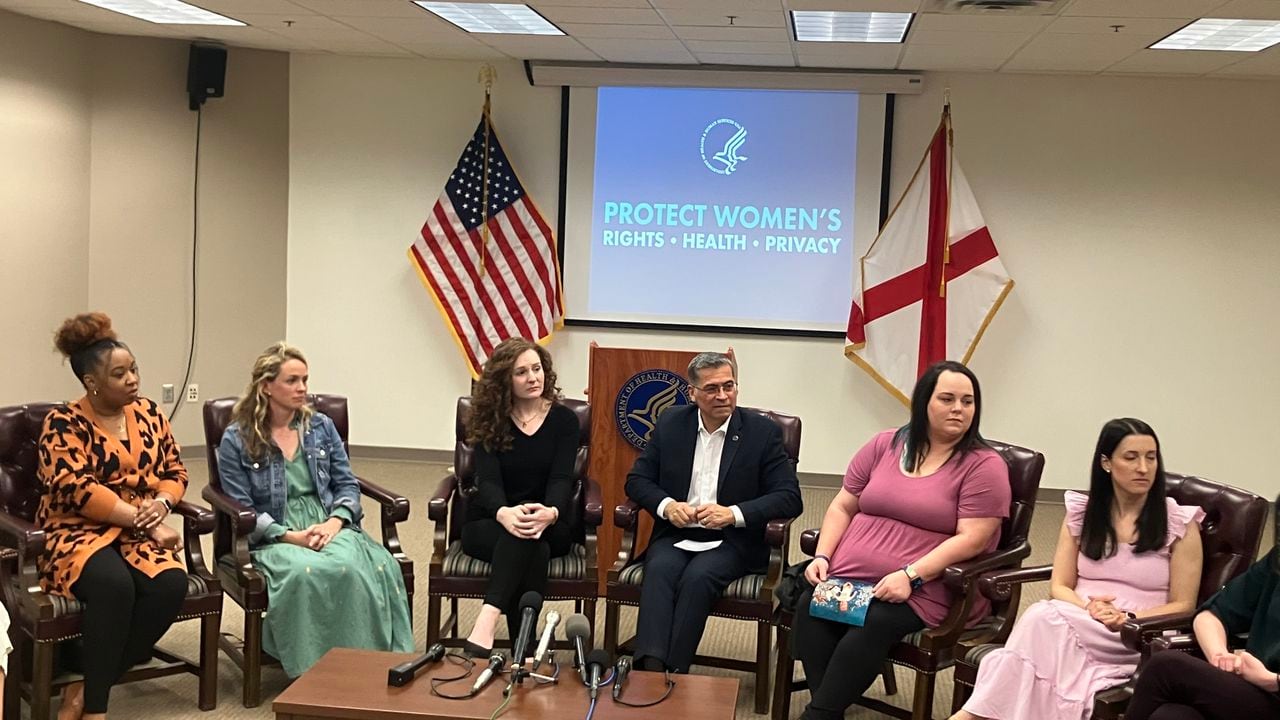IVF patients, doctors say they have limited time in Alabama: ‘Don’t take away that chance’
In vitro fertilization patients in Alabama say they feel their ability to have children and start families has been stripped away.
IVF patients gathered Tuesday with Department of Health and Human Services Secretary Xavier Becerra to discuss how the new Alabama Supreme Court decision, which found that fertilized embryos have the same legal protections as children, affects them. The Feb. 16 ruling forced surprise pauses of procedures at three clinics in the state, disrupting patient procedures.
Practitioners are now contemplating whether they will continue to practice in Alabama and IVF patients are traveling to other states for embryo transfers as a result of the ruling.
Elizabeth Goldman moved across the state and joined the University of Alabama at Birmingham’s uterus transplant program in 2020. She then underwent IVF, had a baby in October 2023, and was about to begin IVF for another baby – likely her last chance to have a baby with her uterus – when clinics shut their doors.
“My whole entire life, my whole entire journey revolved around IVF and being able to have another embryo transfer,” Goldman said.
As some Alabama IVF patients are feeling hopeless, state legislators and federal officials are working to find solutions.
“I came to listen. This is a state supreme court decision. We are trying to figure out what we can do to help at a federal level to try to be supportive of people who want access to their healthcare rights,” Becerra said. “When Roe went down, it took away health care rights and access.”
Abortion and reproductive health are likely to be election issues across the country. President Joe Biden has blasted Alabama’s ruling. Former President Donald Trump has said he supports the availability of IVF in every state.
Alabama legislators have introduced bills, HB225 and SB129, that legally would protect IVF procedures. Federal legislators are also looking at the issue. Clinicians say they need protection from the threat of criminal and civil prosecution before they can begin operating again in Alabama.
Kendall Diebold is an IVF patient and nurse practitioner at the University of Birmingham and said many of her patients are also dependent on IVF to have children.
“We have an oncology fertility program that is entirely in jeopardy because of this ruling and there are so many young people who depend on IVF as their only means of having children,” Diebold said. “The whole IVF world, the infertility world as a whole, is so isolating and lonely. And this ruling has taken all of that and magnified it and filled it with sadness, and grief and anger.”
Julie Cohen, an infertility nonprofit advocate with the Jewish Fertility Foundation and IVF patient, has 4-year-old twins, Gideon and Levi, born through IVF treatment.
Cohen said her work in infertility advocacy was inspired by her own journey with infertility.
“My husband and I have been through years and years and years of infertility, that includes numerous surgeries, numerous [intrauterine inseminations], six IVF transfers, eight losses and a termination for medical reasons,” Cohen said. “This was my only IVF transfer that gave me living babies. All of my other transfers that were only one embryo did not give me a living baby” she said.
“I recognize that infertility and IVF are the most isolating things. You feel like you are the only person in the world going through it, and one of the only ways to get through it is to have a strong support network,” Cohen said.
Alabama Supreme Court Chief Justice Tom Parker, who used multiple Biblical references to justify fertilized eggs having the same legal status as children, suggested physicians should only make and transfer one embryo at a time.
“I wish that every embryo became a living baby, but I am here to say that every embryo is the chance of a living baby. And this recent ruling is taking away that chance for all of us,” Cohen said.
She said she is working with other IVF patients who have had transfer appointments and retrievals canceled. Some are traveling to Atlanta to begin treatment.
Jared Robins, CEO for the American Society for Reproductive Medicine, said the ruling has caused a lot of questions for clinicians, who may not be able to quickly accept new patients from Alabama. He added that, without clearer legal protections, clinicians fear that embryos lost to miscarriages or other natural causes could be considered a life in wrongful death lawsuits.
Stephanie Perry, an IVF patient, has a 3-year-old son conceived through IVF.
“When our son was born, in December of 2020, it was the brightest, most beautiful light in what was such a dark time,” Perry said as tears welled in her eyes.
“We’re not finished growing our family. And the ruling that came down, I just think about the families that got a phone call from their doctors that said they can’t move forward. I am devastated for them because it’s a chance, it’s not a guarantee. I am asking, don’t take away that chance. Don’t take away that light from these families.”
Eli Palmer, a special education teacher, said her insurance does not cover fertility preservation through egg freezing, surrogacy and IVF. But she needs IVF if she wants to have a baby, and so in February, she decided to freeze her eggs at UAB.
“I just cannot live under the false belief anymore that in this country, and certainly not in Alabama right now, that I have the freedom to make choices about my body, my reproductive health, my future that are right for me,” Palmer said.
